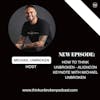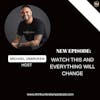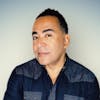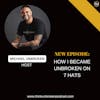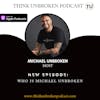Rise Up from Rock Bottom | Unleashing Your True Potential | with Nada Nasserdeen
Are you ready to unleash your true potential? .Join us as we dive deep into the transformative power of resilience and self-discovery, featuring the remarkable guest speaker, Nada Nasserdeen... See show notes at: https://www.thinkunbrokenpodcast.com/rise-up-from-rock-bottom-unleashing-your-true-potential-with-nada-nasserdeen/#show-notes
Are you ready to unleash your true potential?
Join us as we dive deep into the transformative power of resilience and self-discovery, featuring the remarkable guest speaker, Nada Nasserdeen.
Nada, a renowned motivational speaker and life coach, shares her profound insights and practical strategies for rising above life's challenges. With her unique blend of wisdom and compassion, Nada inspires you to embrace personal growth, develop resilience, and harness your inner strength!
************* LINKS & RESOURCES *************
Learn how to heal and overcome childhood trauma, narcissistic abuse, ptsd, cptsd, higher ACE scores, anxiety, depression, and mental health issues and illness. Learn tools that therapists, trauma coaches, mindset leaders, neuroscientists, and researchers use to help people heal and recover from mental health problems. Discover real and practical advice and guidance for how to understand and overcome childhood trauma, abuse, and narc abuse mental trauma. Heal your body and mind, stop limiting beliefs, end self-sabotage, and become the HERO of your own story.
Join our FREE COMMUNITY as a member of the Unbroken Nation: https://www.thinkunbrokenacademy.com/share/AEGok414shubQSzq?utm_source=manual
Download the first three chapters of the Award-Winning Book Think Unbroken: Understanding and Overcoming Childhood Trauma: https://book.thinkunbroken.com/
Join the Think Unbroken Trauma Transformation Course: https://coaching.thinkunbroken.com/
@Michael Unbroken: https://www.instagram.com/michaelunbroken/
Follow us on TikTok: https://www.tiktok.com/@michaelunbroken
Learn more at https://www.thinkunbrokenpodcast.com
Learn more about Nada Nasserdeen at: https://www.riseupforyou.com/
Support this podcast at — https://redcircle.com/think-unbroken-with-michael-unbroken-childhood-trauma-cptsd-and/exclusive-content
Support the Podcast: Become a listed sponsor!
Follow me on Instagram @MichaelUnbroken
Learn more about coaching at https://coaching.thinkunbroken.com
Get your FREE copy of my #1 Best-Selling Book Think Unbroken: https://book.thinkunbroken.com/
Michael: Hey! What's up, Unbroken Nation! Hope that you're doing well wherever you are in the world today. Very excited to be joined with my guest and friend, speaker and author, Nada Nasserdeen. My friend, how are you? What is happening in your world today?
Nada: I'm amazing. Thank you so much for having me today.
Michael: Yeah, it's an honor. Been looking forward to connecting with you. We've had the privilege of speaking together on stage before and just moved and kind of blown away by your power, and we're gonna get into that and talk about that a little bit in depth. But before we do, what is something that I need to know so that I can know who you are?
Nada: There's a lot there, but I would say one thing that's probably really important that's defined who I am today is losing both of my parents. By the time I was 31, it really shaped my mindset and my mentality towards life. And I can go deeper if you want.
Michael: Yeah. What does that mean? We have time.
Nada: Yeah. So, I'm very fortunate in that the first half of my life up to this point, it was a very white picket fence which I know is like the opposite of kind of what you went through. And I had two amazing parents that came, you know, from a third world country, and they somehow knew and understood that the number one thing that my brothers and I needed was self-love and self-confidence. So, our whole life they taught us that. We had a great quality relationship with both of our parents, but unexpectedly we lost our dad when I was 27 and that was like the first time ever in my life like had trauma or felt something so deeply, like profound inside, I didn't really know how to process it, it was the first thing in my life that made such an impact in a painful way. The first funeral I ever went to was my dad's and then a couple years later, I lost my mom when I was 31. Both of them died when they were 62 or 63 years old and it really shifted my perspective on life like, why are we here? What's the purpose? At the time I was a corporate executive, you know, so anyone that's been in that space, like, you're constantly working and grinding 12 hours a day and it's all great like, I loved it, but it really shifted my mindset on what does it mean to build a life that you're proud of? My parents worked their whole life to reach retirement, and they never got there and so that really shifted me. The two most important people in my life passed, you know, before my brothers and I, even before I built the company, before we got married, before we had kids and so that really changed me a lot.
Michael: Yeah. Death will do that. And I think about this probably every single day of my life. It's like if you can change your relationship with time and death, like you can change your life. And I think unfortunately part of it is like it's just gonna get handed to you ‘cuz we don't get to control this. And you know, all of us would love for our parents and our friends and our family and our partners to live healthy long lives, but obviously that's not the case. When you talk about shift, because here's the reality, it's not uncommon that people have that and a single loss can be such a traumatic experience like I've coached people where it's kept them trapped for 25 years. Fear has overtaken them, they become ostracized, they don't do social things, they disappear from the world. What was it like for you?
Nada: You know, it's interesting because they were so inspiring and amazing, the first half of my life, I had nothing but gratitude, like I had pain, but at the same time, I understood that, like you said this is one thing I cannot control. You know, everyone passes away, we can't control when they pass away. And so, I constantly needed to shift myself towards a mindset of gratitude that I'm just lucky that I had the quality of parents that I had. Did I want more quantity, of course, but I didn't want my pain to go to waste. So losing my parents, it was like, the thing that came into my mind is I'll be damned if their loss is gonna go to waste like I'm gonna use that pain and the best of what they left my brothers and I to build something and grow something. And I was also going through the divorce at the same time when I lost my mom, I built my company out of a hospital. So I was like, I was going through a divorce and losing my mom who was sick and I was building Rise Up For You at the same time and like taking showers at the gym across the street and running back. And so, like I really got my butt kicked, but it was just a really great sign of gratitude and like, where can I go from, I'm here? And I think you're right, there's a lot of individuals unfortunately, that they go through this breaking and they stay there, they never really grow from it. They might maintain, but a lot of individuals don't take that pain and then say like, now how can I make myself better and truly make an impact in the world? And I just refuse to do that. I was like, no, I gotta do something with this.
Michael: Yeah. Was that every day?
Nada: No, of course not. There are definitely times, I mean, when I lost my mom, I went through like a depression like the first year I was sleeping long hours, you know, had to really process what I had been through and unfortunately, she had a traumatic passing. She had cancer and it was just freaking brutal like anyone that has lost somebody to cancer and you are there supporting them and helping them, the impact it's traumatic and it was for me. So, with my mom losing her, but then also processing like the day-to-day challenges that we went through when she was sick, it took me a long time to even have happiness again. I would wake up and all I would have were nightmares and dreams about it, and it took me a long time to reconcile. I had a different connection with my dad, so when he passed, I didn't have that same feeling like I had peace when he passed with her, I didn't because I've felt sad with how she passed.
Michael: Yeah. Unfortunately, again, we don't get any say in that and it's fascinating to me that you're in this position of seeking gratitude in this. One of the alarms on my phone that goes off like five times a day just says say thank you, you know how important it is to remind ourselves of gratitude. It's hard to get, like, I think about it a lot, I experienced death for the first time when I was like seven years old. And then growing up in the environment, I did lose my three best friends, losing my mother, my grandmother, all the drugs, alcohol, you know, all the things that people step into to be avoidant of life. And look, the reality is I probably wasn't very far from that either, that's how I hit rock bottom at 25, 26 years old. And it was really kind of, not only gratitude, but something you said that was important that I think people don't utilize enough, and it's like you have to push yourself through. You know, here you are, and look, no one can take this around from you, you have every right in the world to not show up, to disappear, to be in the sweats and eat ice cream all day long, all of the things. And yet despite losing your mother, going through a divorce simultaneously, you made a decision like, I'm going to build something, I'm gonna rise up.
Nada: Yeah. And I think it's important to process. I never want people to think that they need to be a robot and be like, I just gotta get through it, you have to process, but you can't stay there forever. You know what I mean? And I think that that's the decision that we need to make as individuals is like when we're going through these tough times, how long are we going to sit there? You gotta process, you gotta talk it out. You know, hopefully you have good people in a community around you, but then use that to drive you forward in instead of just staying there. And I think this is something that I see with potential as well because, you know, we talk a lot about potential and trying to reach your potential consistently. And sometimes people wait for the breaking before they realize that. One thing that I think about a lot that I'm actively trying to, I guess find this, I don't wanna say the solution, but find some key steps for is, how do we help individuals that maybe haven't gone through this kind of like trauma or difficulty to move forward when everything's cool, when everything is okay. And I think that that's something to think about as well.
Michael: Yeah. I've contemplated that a lot over the years. I mean, anyone who's been in your seat or online with me over the years that I've asked this question, we all kind of get to the same conclusion, I don't think you can change your life until something like jump you off the bridge and you're like, falling and you're like, sh*t. Right. What was processing like for you?
Nada: Writing the book was a big part of it. I wrote the book Rise Up For You, Closing the Gap Between You and Your Potential that took me two and a half years to write, it took me about a year to get through the chapter where I talk about my mom.
Michael: Why?
Nada: Just like, again, it was really difficult with how she passed and for the first year, I couldn't accept how she passed. I don't think people are afraid of dying, I think people are afraid of how they will die. Right. How are you gonna just not wake up one morning? Are you gonna die in your sleep or are you gonna get sick? God forbid. And so, for me, it took me a long time to just accept how she passed. And from my perspective, she suffered and that was hard for me to reconcile that she suffered and she didn't deserve that ‘cuz she was such an amazing person. When I was writing the book and I'm very authentic in the book, I do put some strong detail in there because I think as a culture sometimes, we're afraid to just like, talk openly about death. We're afraid to talk openly about death, about divorce, about trauma that we've had in our life and so a lot of people just hold onto it. So, I made it a really big point in the book to know, take step by step about some of the things that happened when she passed and how difficult it was and that was hard for me to get out. Like I remember like writing a couple paragraphs on the plane and then I would start crying and I'm like, I gotta put this away for a little bit because it just kept coming out.
Michael: Yeah. What was that like? Like if you went into it, like, ‘cuz those moments I remember I was sitting in the care center when my grandmother was dying of dementia. And all truth, when I look at her experience, I always remind myself like, and it breaks my heart to say it, but it's just true. She put herself in that situation, the drugs, the alcohol, the cigarette, this woman f*cking smoked cigarettes on an oxygen machine, and I watched. And on some of those days it was like I would walk into that hospital until I couldn't anymore. Right. And I was young, I was like 23, 24, and I would walk in there and I would look at her and she would no recollection of who I was outside of like these very minute, gleaming moments. And there was a lot of tension unresolved between her and I when she died, just because of her being a bit racist, me being biracial, but also her raising me, which was really f*cking complicated and eventually I could not go anymore. Right. Even to this day, I don't say I regret it. I had to do what I had to do but I remember those moments and just loss is so devastating because as much as we're like, I wish I could solve this, I wish I could fix this problem we don't get that say. And you talked about reconciliation, right? And trying to reconcile the fact that your mother was this incredible person who in your eyes suffered. Have you reconciled that?
Nada: No, I don't think I have. I've definitely gotten better, but again, there's just a pain there with how she passed that, I don't know if I'll ever reconcile with how she passed. I think what makes it difficult is sometimes when people are sick, they accept it, right? And they accept that they're going to pass, she didn't. So up until the day she passed, she didn't wanna die, she didn't wanna lose her life. We watched these movies where someone's sick and they're like, just let me go, like, it's my time, that wasn't her experience because she was young and she was healthy and she lived a good life, but she just wasn't ready. And up until the day she passed, she was not ready, she couldn't reconcile it. And so, I couldn't reconcile it either and how she happened and then there was just like also a lot of challenges with the medical system, which, we're not gonna dive into here, but lots of mistakes that happened, lots of statements about you're gonna survive. You did it, you made it, and then a week later you're terminal. So it was also in a very difficult time emotionally because there was mixed signals from the medical institution. So, one day she was surviving and she beat it, and then the next day it was like, it's all over your body, you're terminal. So there were some challenges along the way and I think I've reconciled it to the best of my ability at this point and I guess I can tell by the dreams that I have for years, all of my dreams with my mom were her sick, and I'm finally having dreams where it's her again.
Michael: That's really beautiful. I think about how we often leverage like those last moments as our final memories of those people. And it's like we tend to forget where the good things were, where the amazing moments were, where the lessons were, where the experiences of like, wait a second. They're not sick, they're not in the hospital, they're not in this. And so, I'm curious like what's your favorite memory with your mother in your whole life?
Nada: I have a lot, but the thing that I can say I really appreciate about my mom is she was a disrupter. And I didn't realize until I was older, like my mom was a Middle Eastern woman, a hundred percent Lebanese, when she was young, she wanted to be a model. So, she would like sneak outta the house and she's miss Pennsylvania like my grandma didn't know because like in the air of culture in the seventies, locking on stage in a bathing suit was just not acceptable. And she was that person so she would sneak out and then she would go compete in Pennsylvania. She became Miss Pennsylvania and so she walked her walk and she did her thing. And that's what I remember about my mom is even though, you know, we come from an amazing culture, she just did things her own way and she taught me to do that. So, when I was growing up, I wanted to be a singer and my dad's like, what are you doing? Go be a doctor, lawyer. And you know, anyone that's a part of that culture understands that. Right. And my mom would be like, did you go sing? Go do it. You could do it. And she constantly, she just let me do my thing, and I did, you know, my first career I ever had, I was a performer. I toured the world as a singer. And my dad was like, why don't you go get a PhD and become a doctor? I'm like, I'm getting my degree in vocal performance, he's like, what? And my mom's like, good job. So, my favorite memories were the fact that she was really good at tuning out, like the noise around her in society, in culture and she just did her thing and she taught my brothers and I to do that as well, and that's what I loved about her.
Michael: That's such a great lesson because we get so indoctrinated into what society tells us who we should be. And then you're faced with what I would consider to be a, probably a really difficult juxtaposition of here's your mother, who's like, go for it, and your father's like, what are you doing? How did you navigate that?
Nada: Yeah. Well, my father was also very empowering too. He just wanted us to take the more traditional way. But meaning like he saw that I had good grades, so he said, go do something that's gonna make you a lot of money and their eyes. And he was from a third world country. He came here with $20 in his pocket, he had three jobs, he struggled and he didn't want us to, and I don't think he could see that music could make any money. Right. He's like, what are you doing? And I got straight A's and I was a good student. But a lot of times people ask me like, oh, you come from a Middle Eastern background, I'm like, I don't come from a family or a culture where the father figure my dad, he was also very empowering. He taught my brothers and I to have confidence. And I would say he's the one that really forced us to understand our potential. I mean, I would come home with an A- and talk about this in the book, and he'd be like, why don't you have an a plus? And I'm thinking A- is pretty good dad. And he's like, but can you get the A+, yeah, so if you could reach this, why did you sell yourself short? Not for me, not for your teacher, but for you. And he was really great at that. So, I had my dad who was pushing us to reach our potential and then I had our mom who was like affirming us to just be our best self and be true to us and the combination was just freaking amazing.
Michael: How did your father teach you how to find confidence?
Nada: I think it was through questioning it and it was through always pushing us a little bit more, challenging us. So again, like when I had the A-, can you do this not for me, but for you? Do you think you can? Yes. Okay. What do you have to do to get there? And also, just through questions, you know, every time I asked a question, he was like, you tell me, what do you think? And he always, even growing up, even with teachers was like, I need you to know that nobody is better than you and you're not better than anybody else. Period. And every day he was like, you are not better than anyone else, and no one's better than you. I don't care if they're the teacher, I don't care who they are. People are people, and you need to be respected and you need to respect as well. So that creates, I mean, think about it today, especially when it comes to self-confidence, a lot of times individuals struggle because they wanna be liked or they want approval, or they want validation, or they want a people please. And because he taught us that we're all the same and we just need to prove it to ourselves like that concept of I need to be validated by that person, or I need to please that person, it never existed for my brothers and I.
Michael: That's powerful, that was a struggle that I had to work through for a very long time. Growing up and looking at the world through an opposite lens and hearing my own parents say, you're not good enough, you don't matter, your loser that gets reinforced in school. I found confidence literally through the same way that you just laid out, just on a different timeline. Right? When I found myself in my twenties after hitting this rock bottom, it was just like, how hard can I push myself? Like what could I really do? And this is a weird thing to understand and until you understand it, and I think this may apply for probably most human beings, I was like, I'm weak. And what weakness felt like for me was not standing up for myself, not showing up, not rising up, doing all the other things for all the other people except for the things for me that I know that I needed to do. And it was like massive codependence and partying with people who could give two f*cks that I existed and like doing whatever. If you liked me for 10 seconds, I would do everything for you. Right. And so, finding confidence really is about that like recognizing we are all people, nobody is better than anyone else. No one is above you even though we like to think that they are, that's like a mind game. We have to stop playing with ourselves and I think the only way you get through that and you navigate it is like you have to do hard sh*t. You have to do hard sh*t. And that hard sh*t is like your dreams. Like it's the thing that keeps you awake at night and people are so scared because of the fear of failure, the fear of judgment, the fear of shame like things we talk about all the time. And I just constantly come back. I'm like, you're gonna f*ck up anyway, you're gonna suck all the time at new stuff. And people are like, I want to be proficient before I show up. And it's like, I remember that, you'll appreciate this guy as a speaker, the first time I did any event on my own, two people came.
Nada: Yeah, a hundred per percent. Oh my God. I had one, and I was like, we're gonna do it!
Michael: You know? And I'm like, f*ck it, let's go. The first time I coached people, like I didn't know what I was doing. You know, I probably still don't, I'm like, I even tell people all the time, I would not listen to me if I were you. But you know, it's so much of that is like, what are you willing to do to create this life, this thing that you want? But there's roadblocks, there's death and then as you mentioned, divorce and it's like those things cripple people, especially divorce. I heard somebody say something really interesting the other day and they said, I wouldn't wish that on my worst enemy.
Nada: It's tough. It is tough because there's trust there or there's love there and especially if there's like betrayal or abuse or things in a relationship, it can really crush an individual. And I know for me, that was the first time that I felt a little unconfident, I was like, is that true? Am I like not a good woman? Am I not enough? I started to have these thoughts in my head that I never ever had before in my life. I started to question like, do I bring value to this person? And that can really destroy somebody, especially if they've heard that narrative before, because now you are validating that narrative by somebody that you've given your heart to, that you've opened up to. And it's interesting because along with like building a business or taking a leap in career, I would say just working with clients and experiences that romantic relationships is one of the biggest confidence crushers. It's one of the biggest confidence crushers. I mean, because again, there's a vulnerability there, there's a different chemical like reaction obviously when you're intimate with somebody versus your family and there's trust there, there's protection, there's a lot of things that are sacred in a romantic relationship. And when that doesn't work, you can't reconcile why, it takes a long time to understand, that was the first time for me that again, I questioned like myself as a woman, I'm like, am I not a good person or do I not add value? Am I not lovable? What's happening? But because of my parents' love, I quickly got outta that mindset where I was like, no, I don't think that's the case, maybe it's not about me, maybe it's a projection of trauma, and my dad came to me in my dream. I remember when I went through the divorce, I was only married for one month, that's it. And as I mentioned, I was an executive at the time and I resigned from the company got rid of all my stuff, got rid of my job, everything. And I moved out of the country with two luggage. That was it. And within a month, it was like, I don't wanna be married anymore. And I remember thinking, what are you talking about? What do you mean? Long story short, I got on a plane after a month and I only had two luggage and $100, that's it but basically, lost everything. And I remember getting on that plane and crying and bawling, feeling betrayed, how does you know someone that you deeply love, get feeling abandoned? And my dad came to me, I don't even know, it was just God in the universe. He came to me in my dream ‘cuz he had passed away before that.
And he said, Nada, everything you need is already inside of you. You just have to rise up for you. And that's where the company came from, that's where the name came from. Is being on that airplane and sleeping and my dad's saying, rise up for you. And I came back from out of the country, came to California. I was like, all right, rise up for you, that's all I can do. No one's gonna knock on the door and mend my heart, gimme my job back ‘cuz I already, you know, filled my spot. Gimme my money back. None of that's gonna happen. So, what are you gonna do with it? So, I just started building Rise Up for You. And like you said, I never built a business, I was an entrepreneur five years ago. I didn't even know who Tony Robbins was like this industry that you and I are in, I'm like, what is that? What's coaching? I've never heard of that in my life. And I just started building and started growing and started researching how I can make an impact in the world and contribute and I just started and then three months later my mom got sick.
Michael: The universe is so interesting because you are always gonna get hit with these curve balls. And I wanna go back into that relationship thing for a moment ‘cuz as you were speaking, it made me think like I consider myself to be an incredibly confident human being. I have earned every inch of that, I can f*cking assure you there, if you saw the list of sh*t that I've put myself through intentionally to grow like, you'd be like, this guy is insane which is probably accurate. And so, I went through a breakup three years ago that destroyed me, I didn't even see it coming. Right. And it was one of those things where mutually we decided like, yeah, we're not the right fit. And I remember just in my truck just destroyed. And thinking to myself many of those thoughts that I hadn't had in years because what's really interesting about a relationship, it can rise you like this is a word we're probably gonna use a lot today. It can rise you in, just like you have confidence, you feel like you can take on the world. You have f*cking support system, like you're protected and promoted as our mutual friend David talks about. And then it was like in a blink of an eye, I was like, should I be a coach? Should I write books? Do I keep making this podcast? Do I go speak on stage? Do I just need to go work at f*cking Wendy's again? Like I felt like so crippled by it. And there's something about that where you have to get inside of yourself and recognize and like, look, it could be your fault, it could be their fault like somebody's at fault here probably both of you ‘cuz it is a mutual exchange. And I think to myself like sometimes it's just not the right time like that relationship, that thing on another planet, on another universe, even though we love these people tremendously and they love us, like it's just not right. And we fight that tooth and nail tell for some people tell death, right? And you're like, geez, like just do something different. And to reflect inside for me, I remember Grant Cardone told me something one time. So, I've shared this on this show before so guys, bear with me. I know, I won some event that he was hosting where we did this pitch for the businesses and like, I won, and this is in front of 10,000 people, it's like this huge f*cking deal. And I'm like, hyped ‘cause I'm hyped, I get hyped. I'm in that moment like that's my favorite thing to do. And he goes, bro, time out. Hold on, hold on. Just take your flowers. He was just like raining accolades on me. He was like, dude, you were so amazing. No one even came blah, blah, blah, just take your flowers. And it was like in that moment, like sitting in my truck, literally bawling, having one of the worst nights of probably my whole existence, right? That moment, if you've ever had heartbreak, you've had that moment. Hearing his voice, go take your flowers and then me going, give your flowers to yourself, mother*cker like, give yourself the thing that you know, that you are who you are, what you've done. And so, I'm curious for you, what is it that you started to do to rebuild your confidence after that moment?
Nada: Yeah, that's a good question. Self-reflection I think is really key. So, for me, I did the opposite of what I think, I don't know, maybe the majority would do. I started to ask myself where did I go wrong? So, in that relationship, where can I take ownership? And like, because like you said, it's always mutual, but sometimes we have so much pain that we can't see it. So, what I wanted to ask myself is that I wanted to heal to make sure I didn't do it again. So, I did a lot of self-reflection to build my confidence and to understand what happened that I was in that situation, so I don't do it again, so that my confidence doesn't get hurt again.
Michael: What is the “it”, so I don't do it again?
Nada: So I don't get into a relationship that I know isn't right for me. And so, for me, you know, he's not a bad person, he's a great person. But I needed to ask myself, okay, after one month, what happened here? Did I see signs or did I ignore them? And I realized that I did, and I realized that this has nothing to do with him or me. It has to do with the fact that before we got married, I knew in my stomach. And the thing that hurts me the most is not that side of things, is I betrayed myself. So, when people ask me like, do you have any regrets? And I don't have any regrets, like great human being. But what I'm not gonna do again, is betray myself because I knew in my stomach and I kept shutting that part down and we do that as individuals, you know, because we want love. And again, love is romantic, love is very different than any kind of love. And I don't bind to this narrative that like, you need to love yourself first, it's like, no, I'm a confident woman. You're a confident man, but we still want love. Right? You still want that part of your life.
And I betrayed myself in that moment, and that's what I needed to process so that I can build my confidence. And again, is recognizing what was my part and then what's not my part? Because part of building your confidence is not taking ownership of sh*t that doesn't belong to you. And so, I really sat with myself and I was like, what can I take ownership of? And then what are the things that, like, this has nothing to do, this isn't my pain, this has nothing to do with me. Maybe it's that individual's pain, or that's individual's trauma that came out, but what's my role and what's my ownership about what just happened? Where my role was is that for months I knew and there were things that happened that I was like,and it did help me build my confidence because it helped me recognize what I should take ownership of and what are the things that have really had nothing to do with me.
Michael: Yeah. That's clarity, right? That's the thing that people lack constantly. And I think there's always something to take away from those moments of self-reflection, and I'm right there with you. I sat in that moment and many moments in my life about things where I was like, f*ck. That did not go the way I thought it was gonna go. I'm not talking about just, I'm just life because life is not always gonna go. What did I do to put myself in this situation? How did I show up? And you said something, you did not trust your gut. Like when I coach people, this is, and even if they're just listening to this show, I'm like, this is the number one thing you have to do like, f*cking trust your gut. It's never been wrong. Not one time in your whole life. And if you trust your stupid brain, you're in trouble because your brain is setting you up for failure constantly ‘cuz it doesn't know what's best for you, it only knows what's good for you and it keeps you safe. And like, getting into that space of reflection, I've often come back into it and I will take a pen and a piece of paper now I use iPads of up my technology. And I'll like line down, I will literally do a pros and cons list, but it's more of like, what did I do? What did they do? What did I ignore? And I remember thinking about the day that I decided to get in the relationship with that person and being like, no, I don't think I want this, but then doing it because there's always still that part where you go, well, I don't know. You know, you're always a little nervous, you don't really know, but my gut was kind of like, I don't know, man. And then the signs, they roll out, there're in front of you. And I think one of the hard parts about this is heartbreak cripples’ people and it keeps them trapped forever. And people are gonna listen to you and I, and they're like, well, good for you guys, I'm glad you figured out what was next and it's like, well, you can too. But I think a lot of it is recognizing like, you aren't a failed relationship. You aren't a business that didn't work. You aren't a loss in your life, whatever is hap it's over. This is what I figured out one day, I was like, it is over. Like, the four seconds ago is gone. I cannot change it. And I've realized, and again this is just my nihilistic point of view in the world, but like it doesn't actually matter like in the scheme of things like those heartbreaks, they teach you lessons, they help you understand yourself at a depth that you could not understand otherwise, you wanna figure out who you are being a f*cking relationship or start a business.
Nada: Well, I think you have to ask yourself what kind of life do you wanna live? And for me, it's really clear for me that I wanna live a life of feeling and being present and being, I heard a speaker one time say, commit to dying empty. Meaning that, God forbid if I die tomorrow, I have given everything I have emotionally, mentally, physically and that's the commitment that I've made to myself so, I'm prepared to get my teeth kicked in. And I think that we as individuals, we have to decide, do we wanna live a life where we're guarded and we're afraid to love, and we're afraid to build a business and we're afraid to build something that feels great for us because we're scared? Or do we wanna build a life where we're gonna commit to dying empty, even if we get our teeth kicked in? And I've just decided to go that way. So, for me, even now, like all take risk when it comes to communicating, when it comes to love, when it comes to business, because I would rather just do it and fail than not do it. And God forbid, my whole thing is, is that I wanna know that if I don't wake up tomorrow, I've expressed myself completely. I've given everything I have completely, and I really like lived to the edge of who I am, that's a non-negotiable for me. And I feel sad when I see people that are like, oh, I like them, but what if, or, I really wanna build this business, but what if? And it's like, that feels like a life of being trapped and I just I can't live that way. And I think that as individuals, we need to make the decision, well, how do you wanna live your life? And again, I've chosen to live my life where if I get my teeth kicked in, cool, like, that's what it's gonna be.
Michael: Anyone who's listened to this show more than one time knows my motto and what I try to instill in them is this question, what am I willing to do to have the life that I want to have? And if the answer is anything less than no excuses, just results, like you're in trouble, you're not going to get your dreams, you're not going to get the relationship, you're not gonna get the body because we love to f*cking negotiate with ourself. I know this is gonna sound absolutely insane, but when I was 26 and I'm starting in this journey, I realize I only ever let myself down, constantly. And one day it probably is just because I love war movies and I'm into like CA spy sh*t and like I'm watching Homeland and I was just looking at myself in the mirror and I was like, I called myself a terrorist, I know this is crazy, but in the movies, people, the guys all, we don't negotiate with terrorists. And I was like, I have to stop negotiating with myself, I have to stop allowing myself to get in my own way, I have to stop allowing myself to let myself down. And you talked about that, like that is such an intrinsic part of us. I know, that's a weird spin for me. So that's what I want to get into like you don't negotiate with yourself but you have, you're f*cking human being.For me it was like I needed a really high extreme, you know? Cause I come from this background where my mother cut my finger off when I'm four years old. I'm a drug addict when I'm 12, I need extremes to like this boulder is gigantic, right? How do you stop negotiating with yourself?
Nada: I think for me it's really grown with my intuition like we've talked about. If I feel something and I'm excited about something and it's prolonged more than a day, more than two days, more than a week. I don't think about it. You know, the best things that have ever happened for me, were just like on a whim because if you don't take action, you talk yourself out of things. Right. And I know you understand this because of the coaching space as well. And that's why anyone that's listening, if you've ever done coaching or interested in it, that's why coaches say like, make a decision today, work with me in the next 24 hours and we can move forward because if you don't, you're gonna spend the next couple days in the next week being like, oh, should I not? Should I do this? Should I not? So, for me, if I have a feeling that's prolonged, like I don't talk myself out of it, I'm like, done, it's gonna happen, that's what happened with my business after a couple days, I was still thinking about, rise it for you. And I'm like, I'm doing this. That's it. Done. And I never looked back. Same thing when I moved out of state and I came to Vegas by myself, I was like, I had that feeling and I was like, no, I'm moving to Vegas. And I just did it and I won't allow myself to talk myself out of it, because that's where you get in trouble and that's where you're like, but what if, and what if. If something feels good for you, if initially something feels good and great for you, just do it, you'll figure it all out.
Michael: But hold on, you don't understand, every time I do that I f*ck up.
Nada: You'll figure it out. Marie Folio always says everything is figureoutable. And like that's part of the process though, it's like, it's okay to be afraid of messing up and failing. What's not okay is to let that fear sabotage you from moving forward. And I think that's what we're missing in today's world, is that there's this concept of like, I can't be afraid or I can't have negative thoughts, and that's not realistic, we're all human beings, I'm afraid all the time, all the time. I have fear, I have negative thoughts. And so, we need to normalize that like it's okay for you to be afraid. It's okay for you to have negative thoughts. I have crap in my head all the time, but what I've understood is, am I gonna let that dictate my actions? Beliefs, drive behaviors. And I don't want it to drive my behaviors in a way that's gonna hinder and sabotage me.
So, I feel the fear, I have negative thoughts, but then I counter myself and I say, okay, you're okay. It's okay that you have fear, but do you wanna stay stuck or do you just wanna try and go for it? And what's the worst that happens? I always ask myself that question, what's the worst that happens? And is it really the worst thing that can happen to you? You know, and for somebody that's had divorce, that's had loss, you can understand this and appreciate, you've been through a lot in your life, what's the worst thing that can happen and is it the worst thing that can happen to you?
Michael: Yeah. The worst thing that can, this is my opinion, only the worst thing that can happen to you is you die. That's it. Anything shy of that, there is a solution. You can find your way through it, you know? And I think that's what's so interesting, there is an unlimited number of possibilities in the world. Now look, physics apply, you can't be the first person to try to breathe in outer space like that ain't gonna happen. Right. You know what I'm saying? Like, because people, somebody's challenging me right now, they're gonna email me and be like, what about the shut up? It's stupid. Like let's keep it within the laws of physics and reality. But no matter where you're at, whether it's you have hit rock bottom in your business, your relationship, your health, your wealth, your physical being like whatever it is, there's a solution in here somewhere. I'm not saying it's happening overnight like I look at so many of the transformations in my life and it's like decades of work. I mean, I've been doing therapy in my own personal coaching and mentorship for 13 years, and I honestly just now feel like I've taken like a step forward, right? Moving past all of the limitations. And people are like, yeah, but you've been on billboards in New York City and you've written bestselling books. And I'm like, yeah, but you don't understand like every day, like the grinding through the what's better than doing all that other sh*t, getting stoned and playing video games.
Nada: Yeah. And you weren't there, right? Like you didn't start there. You know, we didn't build a business and then overnight be on billboards and get clients and so on and so forth, like, we started from scratch. And I think that is something to really know and for people to hear is like, we started from scratch and if we can start from scratch, you can too. But you gotta manage the fear so that it doesn't cripple you. Otherwise, it's gonna be five years from now and you're gonna be in the same place. It's gonna be 10 years from now, you're gonna be in the same place. And then that's when we build resentment in our life because we never actually just did.
Michael: One of the most heartbreaking things for me about the human experience is knowing, realistically, for some people, it's going to take 25 years to do something that takes 10 minutes. And like that to me is so devastating because it's like, you have so much life in front of you, but we get so stuck in it, so trapped in it. And I think the thing that's missing for people is recognizing like their support out here. And so I'm wondering for you as you were going through, anytime you're building something like it is so hard, building a business is almost impossible, dealing with death, almost impossible. Divorce, almost impossible. What were the mechanisms that you had in your life for support, for growth, for reconciliation, for all the things that have started to pave the path that you are now on? Like what was day one like?
Nada: For me it was, it was community and mentorship. And I had two, I had direct and indirect. So direct mentorship and counsel were like people in my life, like my cousins, my brothers, that we could lean on, that we can support one another that were my cheerleaders. And then indirect mentor was like podcast and going to conferences and hearing people speak and understanding that there's possibility and watching these people do it and hearing their stories. And when you're able to have both sides of the mentorship, you can understand that, okay, wow, they struggle too. I'm not alone in the process of life, that's the one thing about life is it doesn't discriminate. It doesn't care who you are. You're gonna have death, you're gonna have heartbreak, you're gonna have struggle like they don't, it doesn't care who you are. And so having that mentorship was really important for me. I remember when I first came back, I listened to a podcast, which at the time was called The Art of Charm.
Michael: Jordan Harbinger. He's been on the show.
Nada: Yes. Oh, love that guy. He's awesome. And I just happened to listen to the podcast that day when I came back, that was him and a guy named Cole Hatter. And Cole Hatter was talking about his experience and talking about how make money matter like build something where you can still do great in the world. Right? Like nonprofits, you can still make an impact, but you can still make money and build a life that feels good, right? And that you're proud of. It was just that one podcast that I thought, wow, that's really awesome. And then they had a conference and I was like, I'm gonna go to that conference, and I'll tell you, within a matter of a week, I listened to the podcast, I went to the conference, I saw Cole on stage, I saw Jordan Harbinger on stage, and I just did. I was like, all right, we can make this happen. And they were my mentors and they didn't even know. But they were my mentors indirectly, along with my family, directly who were supporting me and obviously they were closer to me and what was happening, but I was also getting a lot of like coaching and guidance in that way. And then I remember a year later, I sat by Jordan Harbinger and Cole I was like, Hey, I gotta tell you this story and they were like, really? I'm like, yeah. So , that's really what helped me and also, self-compassion. Self-compassion and allowing myself to process, so I let myself process, but I didn't let myself stay there long.
So, there would be days where, you know, I felt really sad and I was like, okay, take an hour to yourself. Take two hours, go watch a movie, go for a walk, and then like, let's jump back in. And then the next day, same thing. Okay, take an hour, take a couple hours, let's jump back in. So, I allowed myself to feel, but I was really intentional about not letting it cripple me.
Michael: One of my hopes with this podcast now over five years, 700 episodes, interviewing amazing people like you is like, I hope this can be that for somebody that Jordan Harbinger moment. And the reason that, I hope that is because, and everyone knows this, like, I love podcasts, it's been so transformational for me because I realized one day what it is about shows like this is I didn't have a mentor growing up like my mentors were in some sense, right? My mentors were the streets, it was drug dealers, it was Jay-Z, it was guys who treated women like sh*t and what did my life look like that in my twenties? And I was like, wait a second. Maybe there's another way. Right. Maybe there's something here that I'm missing, and so when I sit down and I listen, I'm studious about it like it's insane. I listen and consume podcasts, like people watch television shows like, I don't even know what's on TV. You can't just say like, that drives when people say that, I'm like, no one has to, but anyway. But my point in saying that is you don't know what impact something's gonna have until you do something with it. You had all the information; this is where I'm going with this. We have so much in, we live in the information society. You can go find out how to do everything. Oh my God. From bacon cookies to like starting a Fortune 100 company, you can go find it all on YouTube, on podcast, on the internet, blah, blah, blah, blah, blah. It's all there. But the thing that's missing in all of that is the action. When you're in that moment, so you have a choice to make, right? You said you make decisions very quickly. I do too. I've learned through business, through life, through investing, through whatever, whether it's like, I'm gonna go roll Jiu Jitsu today. It's like that decision is made in a moment and I just do it. How the hell do you do it? Because for me it is about, again, to your point, trusting your gut, but then further it's like, I don't wanna wonder what would've happened if I would've.
Nada: It's confidence. It's confidence because behave beliefs, drive behaviors, and so I know how somebody feels about themselves just by they way they behave with me. Right. If they shake my hand, if they look me in the eye, even the verbiage that they use when they talk to me. And so, I think a big part, it's exactly what you said, I see this every day when I work and talk with professionals. People that have PhDs, master's degrees, bachelor's, a ton of certifications, everything they need to succeed and yet they still don't take action because they feel like they still need more. And it's like, no, no, no, you have everything you need except the belief in you, except the belief in you. And that is the biggest challenge, is that you can have all the degrees in the world, but if you don't have the belief to take action, if you don't have the belief to have positive behaviors that are gonna lead you to success, all of your knowledge, it's mundane, it doesn't matter. It's not gonna do anything. It's just gonna sit on the shelf. And so that's why I always say that it's really important that you gotta have both. You know, like it's great to go to school and get all these degrees and certificates, but you have to believe in yourself as well. Otherwise, nothing is gonna happen and you're not gonna take action. So, I think it really starts with the belief system and reprogramming yourself to rebuild confidence. Confidence can be built. A belief in yourself. Neuroscientists talk about this all the time. We can reframe our thoughts so that we can move forward so that they service instead of sabotage us. But that's what we gotta work on I mean, my team and I asked thousands of working professionals last year, not hundreds, thousands, what their number one challenge was. 83% said self-confidence that's big. 83%. Now I always say that that's the greatest tragedy today, that's the pandemic is people around the world that don't feel enough, even though they have what they need, they just don't feel enough. And I think that that's what we have to work on, is get to a place where you do feel enough and you're not identified. You're not identified by accolades in your job title and your degrees, so that when you do fail, you are not identified by that. It's just research. Right. And I talk about this when I speak. It's like scientists, they fail all the time. And when they fail, it's just research. It's research towards the solution. It's research of understanding what works and what doesn't work. You're not defined by it. You are not a failure that failed, not you. Right. And we have a tendency as human beings to do that. Right. Instead of saying, you know, I'm unhappy it's like I'm unhappy in this moment. I'm not an unhappy person, but maybe in this moment, right? It's the same thing with failure. I'm not a failure, but maybe that failed, right? But we as individuals, we don't allow ourselves to do that. So, we become defined by these things, and then that's what prevents us from taking action.
So, we have everything that we need, but we don't take action because we're afraid if it doesn't work, then we're not gonna be good enough. If somebody says something to us, we're not gonna be perfect. If it doesn't do what we need it to do, then people are gonna judge us, and that's what we need to shift in our mind, and we won't be able to move forward until we shift that in our mind.
Michael: What is the biggest shift for you in your mindset, in your thought processee, in your self-belief that if you wouldn't have shifted, would probably still have you trapped?
Nada: Understanding that your thoughts are just thoughts. Right. So, you have your thoughts, but they don't necessarily have to be a belief. And I think that as individuals, we get those two confused like I said, I have a lot of negative thoughts, like every person, right? Most of our thoughts are negative. I have a lot of negative thoughts and I have self-talk that's not positive, but I don't allow that to become a belief because when it becomes a belief, like I said, then it drives your behaviors. So, and that's what I've realized is like, oh, I could have these thoughts without subscribing to them, right? I can have negative thoughts without like making it like my testament. And I think that that's what's really important is for people to realize like, I'm having a negative thought right now, but do I need to believe it? Do I need to believe it and subscribe to it, because the second you do now, it's going to, it's gonna deter your action and that's the biggest thing for me. I read a book by Eckhart Tolle called The New Earth. I don't know if you've read it. It's a freaking game. It was a game changer for me is realizing that like, these are just thoughts and your thoughts don't have to drive you.
Michael: Was there one particular that you had to let go of?
Nada: Well, there's a lot that I had to let go of, but right off the bat, something like, I can't think of something right this second. But I think that something that I have to constantly tell myself. See, it's interesting because people have negative beliefs, right? We all do, but sometimes some people have 'em in different areas. I don't have a lot of negative beliefs when it comes to like business and like showing up. But what I do struggle with is like body image. Right. And a lot of people wouldn't think that. So, that's where I have to make my shift, that's where I have to do the most work of not being defined by how I look physically, that's where a lot of my work takes place. And for a long time, I was like, why do I have these thoughts about like how I look and like the number on this scale? And it took me years to realize that, oh my backstory, my backstory is that I had an amazing, beautiful mom who was a model, and that was her backstory, right? Like that was her fixation. And so that's a thought that I had to spend a lot of time breaking down is do I need to look at the scale every single day, five days a week? You know, if I gain a little bit of weight, does it define like who I am as a woman? I would say like right off the bat, that's the thing where I had to do the most work.
Michael: Yeah, that's powerful. I had a client that I was coaching, and of course I won't say details, but you know, they were literally trapped by that scale. And as a man who was trapped by something we don't talk about enough especially as like, men face this as well and I was able to work with him and get him to the point were throwing it away was the most, arguably the hardest thing he had ever done because it was like, that number was the measurement for his worth, for his validity, for his power and prowess in the world and it's like, doesn't matter. Most people don't give a f*ck. Right? Yeah. And if they do, you're hanging around the wrong people anyway and that's about stepping into that freedom, right? It's about closing that gap between you and your potential because that thing is in your way. You know, there, there's so many things in my way in my life all the time constantly, and I'm just like, what do I have to do to get that away from me? Close that gap, and I look at this life as transition. I love the subtitle of your book because I think about life very simple in this scope. Here I am today, this version of Michael and this moment with you having this conversation. And then over here is this version of me that I'm moving towards, this ideal of the person that I want to be. Well, in between those two things is the gap and I'm always like, well, how the f*ck do you close this? What does it take? Who do I have to become? What limiting beliefs do I have to let go of? What actions do I have to take? What goals do I need to set? What clarity do I need to have? And then most importantly, it's like what mistakes must transpire? Because I don't know about you, but I only actually learn the hard way. And so, if I'm not learning through taking action, I don't learn anything. In this word that you use in this subtitle, I think is really important too, potential. I think people quit before they even put on their f*cking shoes. Explain this, like, talk us through closing the gap between you and your potential.
Nada: And that's the beautiful thing is that it's not about reaching your full potential because what is full potential? And how do you know when you get there? But it's about continuously pushing yourself and doing hard things that stretch you. It's about doing what feels good for you and not blocking you. Right? So, if you wanna go ask that girl or a guy out, do it. If you wanna have a hard conversation, do it. And when I talk about potential, I'm not just talking about in your career, it's not limited to building your business. You know, pushing your potential is stretching yourself. When things feel really uncomfortable, it's having that uncomfortable conversation with the person that you needed to have that uncomfortable conversation with, right? That's also stretching your potential. And it's not about full potential because, do we ever reach it? You know, I don't know. I think we get to a place where we feel great and then we're like, okay, what's the next step? But I think it takes consistency and it takes commitment.
John Assaraf said this, and I love it when he said it, it just hit me, are you interested or are you committed? Are you interested or are you committed? So, you gotta decide, are you just interested in growing or are you committed to growing and being a better person so that you can build a life that you feel great about, that you're proud of? And I think that's what potential is about, is every day stretching yourself and doing hard things, even if you don't want to do them, because you know that it's gonna set you up for success.
Michael: And I think to add more to that, and I think this is not talked about enough, is like maybe you just don't want it, maybe you just don't want it and you think you do, or you've convinced yourself that you do, or your mom said you should, or the community did. Or the indoctrination from your childhood depending on your background. You've convinced yourself of something that you do not want. And I think that that is one of the things that you really have. Some people don't want personal development, some people want to go home and eat the gummy bears and play video games. Respect. Respect. I'm not mad at you. Like, if you're good with, cool, cool. But if you're like, this isn't enough for me. I believe you have a moral obligation to yourself, to your community, your family, your church, your potential legacy even though no one's gonna remember you in a hundred years so, it doesn't really actually matter. But it's like in this moment, right now, this is life. What is happening? Not what happened, not what will happen, but right now. And I feel so much sympathy for people who are living lives that are not the lives that they want because we can sit here and talk about like growth and creating these movements and writing the books and speaking on the tape, but that's what we want. Right. The only thing I ever want for people is what they want like you should not give a f*ck about my dreams. Between you and I, I don't care about your dreams. I wanna support you. I want you to grow. I will connect you to every person on planet Earth that I know if it helps you go up that mountain top, but at the end of the day, I don't gotta do it. And I think that's where people get caught up, especially in this personal development conversation because it's so, hype right now. Right. It's like everybody's a f*cking coach and everybody is like, do this, do that. And I'm like, at the end of the day, if you're happy you already won the game.
Gary V. talks about that, I met Gary, God like 10 f*cking years ago and that dude changed my life ‘cuz he was like, if you're happy you win the game. And I realized, like when I started this journey getting deep into this, I was like, I am not happy. So, where do I need to go? And that was towards potential. I didn't know this would transpire. But I just knew it had to be different than getting high all day, weighing 350 pounds and drinking myself to sleep every night.
Nada: But the challenge is, is that most individuals aren't happy. And we know this from research, we know this from like the World's Happiness report, for example. We're like number 19 and we're a first world country, that's pretty bad.
Michael: So obviously you have the report data, but why do you think people aren’t happy?
Nada: Yeah, I mean, 76% of the population even today, are disengaged or unhappy in their work. And I think it's because exactly what you're saying is that people haven't taken the time to figure out what do they want. And so, there's two aspects to this, they haven't taken the time to figure out what do they want, what feels good to them. And the second aspect is if they have figured it out, do they have the courage to live by that? And so, there's a lot of individuals, like you said, that are doing what they think they should do, that are doing what they see on social media, that are trying to get to this certain place and then they get there and they're like, it doesn't really make me happy and then they keep chasing and then they get to another place and they're like, that doesn't make me happy either. And then they keep chasing and they keep chasing and before they know their life is over because they constantly chase something without asking themselves what is it that I actually want? And most individuals don't just sit down and say, what do I want? What's important to me? And now do I have the courage to make that happen? And that's what we're seeing today. I mean, I ask people, what do you want in your life? Well, I don't know. Well, then what are you doing? Like, how are you applying for jobs? Well, I'm applying for jobs so that I can like, pay my rent like, that's not a sustainable way to live. But what do you want? Right. And then once you figure out what you want, do you have the courage to make that happen? And again, that's where the confidence piece comes in. That's something that I got really clear on when my parents passed away. I was like, what is it that I want in my life? I want freedom, I want flexibility. I wanna make an impact. One day I wanna have a family and when I have a family, I'll be damned if I let anybody tell me that I only have like three weeks maternity leave. Right. Like I got really clear on what I wanted. So I was like, so then what is that? I love to travel. You know, I don't wanna be stuck where I can't travel. So, what does that look like? Well, okay, well maybe entrepreneurship is the game for me. Right? And I always told myself, I'm gonna try this. And if at any point it doesn't feel, and I always say this to my clients as well, if at any point this doesn't feel good for you, like don't be afraid to change. But thankfully for me it, it feels great for me and it's working for me and it's awesome. But I have an older brother who's also really great at entrepreneurship, but he's like, no, I like corporate. He's really clear. He's like, I love the corporate space. I could be an entrepreneur, but I don't want to be because I know what I want. And he's like, I really like being in corporate, I like working with CEOs above me and like hearing their thought process. He's really clear on what he wants and that's what he does. But he's taken the time to ask himself like, what do I like and what do I want? And he's walked that path and I think that's fantastic, but not enough people are doing that. And it's interesting because even when I work with my executive clients, I ask them, who are you and what do you want? You would be shocked or maybe you wouldn't. Every single client that I've ever had, which is a lot, have always said, I don't know who I am and I don't know what I want. I need to get back to you. I'm like, well, who are you? I'm an executive. No, but who are you? My mom. No, no, no. Who are you? I don't know. They don't know who they are. They don't know what they want. And so, they're living this life that isn't really theirs, and that's why so many people are not in alignment, and they gotta figure out what they want and what's important to them, and then they have to have the confidence and the courage to live that life.
Michael: Yeah. Confidence is everything. Courage is everything. We all start at zero. I mean, there's no way around it. You are going to suck and then you're gonna suck some more, and then you're gonna suck some less. And then you'll be good, and then you'll be proficient, then you'll be great. And then one day, maybe you're the greatest of all time, but you're gonna be really bad at the beginning. And you have to have, like, courage is such an important word. I try to not leverage it in a negative way with people I interact with in the world, especially who are in my inner circle. But if you don't have a bit of courage, I can't let you in the door because like we're going places and I might be like, yo, I need to challenge you and I need you because you have courage and you've been in that place to challenge me and to say, look, we can do this right? And have the right support system, have the right community. And courage is such a difficult word because people go, well, what's courageous? I mean, like, honestly sometimes courage is like getting the second job to take care of your kids. You know, it's getting off a welfare, blaming other people. And I'm speaking to this like I don't have kids, I can't ever sit here and say, I know what that's like but I get a look at it through the scope of people who have some of the closest people in my life, I've done what it takes to get it done. And I think that's the cornerstone. And when people say that they don't know who they are, I always start with like, well, what are your values? What do you represent? What are your values? Most people have no idea what their values are. And that's where I start all of my coaching, no matter what. If you're in entrepreneurship, coaching, executive coaching, mental health coaching starts at values. If you don't stand for something, you'll fall for anything. And that feels like almost insurmountable because we live in this world where there's not enough honus put on the importance of this. It's like you have to create you. There's a line and Think Unbroken my first book, it says, create you. That's it. You have to make this. Like, I'm all about the manifestation. Close your eyes, visualize, put that shit in the universe. Now go do it. Manifestation is only about drafting up a game plan.
Nada: Yeah, there's gotta be energy and there has to be action towards it as well. You can't just sit and like, think positive. You also have to ask yourself, what do I have to do to like create this energy to move it forward as well? And that's important, you know, but you're totally right about the values thing. I mean, we even see this in companies. It's like, what are your values? They have high employee turnover. Well, what are your values? Well, we don't really know. I'm like, well, how can you expect your employees to be clear? How do you expect your employees to show up and be the best employee they can be if you don't know what your values are? They don't know how to show up. They don't know how to show up for the company. And it's the same thing with individuals. You know, what are your values? And then again, having the courage to live by those values. My top two values are me, God, and me. God's number one, and I'm number two. People are like, those are your top two. I'm like, yeah, I have more. But those are my top two. Why? Because I understand that if I wanna make an impact in the world, which is a value of mine, and I wanna be a great wife and a great sister, and a great whatever, and a great business owner, I gotta take care of me, that values are non-negotiable. So, now I have the courage to take care of me. When people call me at 6:00 AM for work and for coaching, I don't pick up. When clients are like, I need to get you on the phone, I'm like, no, it's not during my work hours because I'm a top value and when I make myself a top value, now I'm my best for you. But people don't have the courage to do that. I mean, if you were to ask somebody, what are your top three values, most individuals will say, like, my family, my health. Right? They'll say, these are my values. These are things that are important to me. Kindness, loving the people in my life. But then if you were to say, well, what does the majority of your time go to in the week? Most of the time it's not towards those top three values. You see, there's a misalignment there. And again, coming back to that courage of being able to say, these are the things that are important to me, and now I'm gonna have the courage to implement those things in my life so that I feel good about what I'm doing on a day-to-day basis.
Michael: And the most difficult part about what you said is that the people around you are going to point it out to you. When I sat down, my values have been like the same for basically a decade, honesty, kindness, leadership, self-actualization, no excuses. Honesty's number one. I will tell you the f*cking, you know me, I tell the f*cking truth as much as humanly possible. I am fallible. But I do my best. Okay. When I started doing that, when I stepped into those values, when I leveraged that system, when I put this in place, you might have well thought I let off a nuclear bomb in my life because the people that started to go away were my best friends, the people I'd done everything with, ‘cuz I stood in front of them I said this, this is the person I'm becoming. I know you really love that old version of me, but I didn't, that version sucked, that person was f*cking horrid. I do not want to be that. And so I think about darkness in this sometimes and the power of that dark energy and sometimes you need it, sometimes you need to leverage that a little bit to go, I am sick of myself. I'm disgusted with my bullsh*t. I am done putting up with me. And in the same way you put you first God, then you, if you are not good with you, you will find a way to make it happen because you has become a value. And I try to tell people all the time, you are the most important person in the room always all the time and that is not a selfish thing, that is a self-care thing. I cannot in what we do in helping people, and at least I try my best. I cannot do anything for them if I don't do something for me first. And that's the old airplane analogy, we beat that thing with a dead horse. But you know, at the end of the day, like it's true.
Nada: It's true. It's more than true. But you know, this goes back to and we can talk about this for a long time, is that everything that you and I are saying, people understand, but what really needs to happen is, make the shift from just hearing it and understanding it to living it and implementing it. And people know like, okay, I gotta put myself first but are they taking the steps to say, okay, how am I gonna put myself first when somebody calls on the weekend and says, I need you to do this and have this meeting, but you're spending time with your family. Do you have the courage to say, I can't this weekend, I'm with my family and that's important? Or are you breaking that violation and that boundary? You know, and that's the thing that I know for me is really important to, like, again, crack that code is how do we get people to hear what we're saying, but then embody what we're saying and take little action steps even if it's one step. One little action step to actually see the change, that's my stomach that's growling there, to actually make the shift and make the change. And you're right, people are gonna put you down and they're gonna tell you all these things. I mean, I work out every day and I have friends that are like, you're sick, why I work out every day? Like, what's wrong with that? Right. But in their mind, it's like, it's crazy that I work out every day. Right. But for other people, it's like, that's good for you. You work out every day. But again, it's that you're going to hear that monkey chatter from people because it's easier for people to critique other people than it is for them to make a shift in themselves.
Michael: Yeah, and that's the story of life. I mean, without judgment. I think that if you can put yourself in a position of just being entirely okay with knowing that the moment you choose you, everyone else is gonna be pissed off at you, your life will be very different. My friend, this has been an amazing conversation, thank you for being here. Thank you for the insight, before I ask you my last question, please tell everyone where they can find you?
Nada: Thank you. I appreciate it, this has been a great conversation. Probably one of the deepest ones that I've had in a long time, especially with my mom, but you can check me out. riseupforyou.com is the website and the handle is at Rise UP For You. You can also connect with me Nada Nasserdeen, you know, I'm all over the website in social media, but definitely check out the website. We have a bunch of free stuff there for people to grab access to, especially with confidence. Connect with me on Instagram, LinkedIn would love to connect with you and talk more.
Michael: Yeah. And of course, if you guys go to thinkunbrokenpodcast.com, you will find all the information in the show notes for this episode. My friend, my last question for you, what does it mean to you to be unbroken?
Nada: Unbroken, to me means using your pain as fuel for growth and not being stuck in the pain and the adversity that you've gone through. It's realizing that everybody is broken, everyone has gone through pain, everyone has gone through trauma. But recognizing that that doesn't define you. Your trauma is not you, it's a part of you. And how can you make that and use it to make an impact in the world and to create shift in the world.
Michael: Beautifully said. Thank you for being here.
Unbroken Nation. Thank you for listening.
Please like, subscribe, comment, share, tell a friend.
Follows on YouTube, apple Podcasts and Spotify. And remember, every time that you share this episode, you are helping us end generational trauma, helping others transform trauma into triumph, breakdowns into breakthroughs, and giving them as well as yourself, the tools to be the hero of your own story.
And Until Next Time.
My Friends, Be Unbroken.
I'll See Ya.
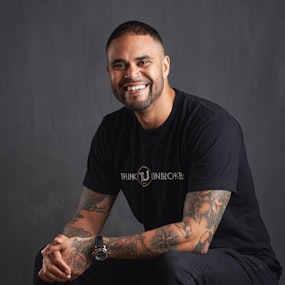
Michael Unbroken
Coach
Michael is an entrepreneur, best-selling author, speaker, coach, and advocate for adult survivors of childhood trauma.
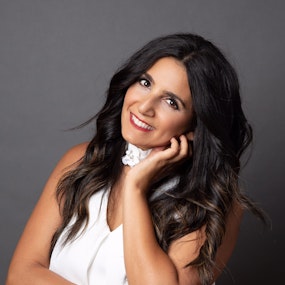
Nada Nasserdeen
CEO
Nada Lena is the founder and CEO of Rise Up For You, #1 Best Selling Author, Leadership and Career Confidence Coach, and 2x TEDx Motivational Speaker.
With over 10 years of experience as a college professor and former top executive for an education corporation, Nada understands the importance of fusing education, empowerment, and leadership together as she works with her clients and speaks to audiences worldwide. She has toured the world as a singer, has a Master’s degree in Executive Leadership, and has coached and mentored over 50,000 individuals around the world on self-empowerment, career strategy, and soft skills.
Nada has been featured on hundreds of podcasts and radio shows as well as a featured motivational and educational speaker on platforms such as TEDx Talks, The Female Quotient, The California Human Resources Conference, The World In Leadership Diversity Conference, Women of Influence, The Virtual Coach Expo, The Wonder Women Tech, The Human Gathering, and more. She's spoken on platforms alongside the greats such as Tony Robbins, Les Brown, Marie Forleo, David Meltzer, and more! She can be seen and heard on Canada's Global TV, Radio Canada, Amazon Prime TV, and Bloomberg as one of the only female co-hosts of The Office Hours, a talk show that interviews celebrities, athletes, and world-renowned entrepreneurs. Most recently she was featured on a billboard in Times Square New York for her work.
Her company, Rise Up For You has been featured worldwide and worked with brands such as CBS, Google Next 19, and various Fortune 50… Read More
Welcome to The Think Unbroken Podcast!
Here are some of my favorite recent guests!



























